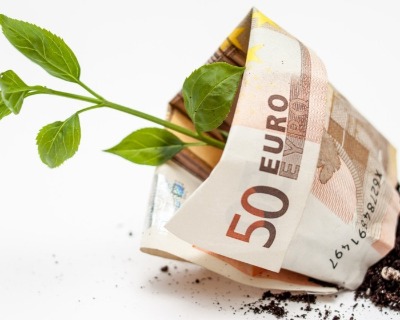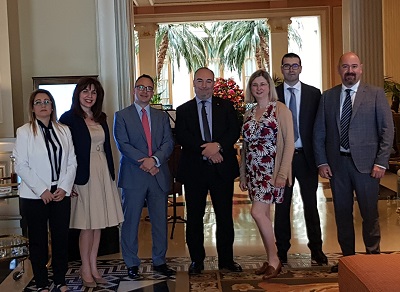Nourishing green shoots in Greek trade
The four systemically important banks in Greece met with TXF at a roundtable hosted by BNY Mellon in Athens and discussed the future of Greek exports. How are the banks helping to nourish and finance green shoots of recovery?

 Panelists
Panelists
Nantia Anemogianni, Deputy Manager, Letters of Guarantees Department, National Bank of Greece
Mauro Bonacina, Head of Trade Sales, EMEA, BNY Mellon
Katharine Morton, Head of Trade, Treasury and Risk, TXF (moderator)
Nassos Pavlidis, Head of Financial Products, Alpha Bank
Katerina Theodorou, Head of Trade Finance Transaction Banking Division, Piraeus Bank
Eleftherios Vlachogiannis, Head of Cash and Trade Services, Eurobank
TXF: Greek GDP grew 2.3% year on year in the first quarter of 2018 driven by exports. How are Greek banks feeling about exports at the moment?
Nantia Anemogianni: Actually, 2018 has been a good period for National Bank of Greece. We have seen the highest peak in exports of goods and services in the last three years in the first quarter. It has been somewhat minimised by the fact that imports have grown as well and especially, the need for longer tenors and credit instruments that importers need in order to carry on their businesses. But, export activity is in a very good state.
TXF: What kind of exports are we looking at?
Katerina Theodorou: We have seen a boost of exports in the first part of 2018 – 4-5% percent versus the previous year – and this is mainly driven by the food industry but also the oil and refining industry where there have been, in the past, growth investments.
The result of this has been an increase in exports of refining oil products from our two main players.
On the other hand, new destinations have been added to the list of export destinations, around half a dozen in 2017. This is a result of the need for Greek companies to be ‘extroverts’ [outward looking] in order to increase their sales turnover and keep their profit margins high.
Some had to be extroverts because they are mainly in sectors such as infrastructure and energy and construction. With the financial crisis there was a slowdown in projects, but in every sector where there has been a slowdown in local activity because of the financial crisis, Greek firms have been trying to expand their activities abroad. Many of them have shown very extensive knowhow and many of those large corporates and SMEs are now respected global players.
Eleftherios Vlachogiannis: I agree with my two colleagues. Goods exports in the first quarter of 2018, through Eurobank, increased by more than 60%, compared to the first quarter of 2017. I would add that the crisis was a wake-up call for the Greek economy, and more specifically for Greek corporates. We used to have some traditional corporates that were extroverted but the majority of corporate and smaller businesses were very introverted doing business only in Greece, mainly as importers. So, the crisis was an alert for them to change steering and start getting involved on how to promote their goods and services abroad.
The fact is that, in Greece, for a number of industries we have companies with good quality products. So, what we´ve seen all these years is, on one hand some companies were investing in infrastructure and in ways to increase their capacity to support their exports and on the other hand, smaller companies who were also making first steps in the international arena.
In this context a critical role arose for the banking system especially to be able to support, smaller businesses and smaller corporates and help them through this journey. What we are trying to do is to provide our support in every single step. Giving them the information that they need, bringing them in contact with reliable counterparts and providing them with the banking tools so that they will be able to make competitive deals abroad. We also help them to secure all the risk around international trade and provide them with liquidity.
Also, in Greece, exports are very much interrelated with imports. The majority of Greek companies have to import raw materials, process them and then produce their final product which will be exported. Indeed, we see growth in exports but at the same time much of it has to do with imports.
TXF: Have you seen any import-substituting exports, any change in terms of companies starting to have less reliance on imports?
Eleftherios Vlachogiannis: You may have some industries that try to insource or keep raw materials coming from the local market, but in general, even for products, like food, that we produce here, you may see imports of bottles or cartons, or paper.
Nassos Pavlidis: One expects an aggressive comeback from the business sector, given that we have been through about 10 years of recession, but things do seem lively and progressing. We have seen green shoots with a better growth rate in several sectors. The Greek economy though has a very specific structure with regards both to its own GDP growth as well as imports and exports. Tourism is its main product, which helps subsidise its trade deficit.
It does rather well in exports in sectors like refined oil as well as raw material for semi-finished goods. We have, among others, a thriving industry in aluminium products, steel or pharmaceuticals. We produce food products. Greece is famous, for example, for the olive oil it produces. Further, given its geographical position, Greece should aim to take better advantage as a transit stage.
TXF: So, 80-85% of Greek trade is still in the service sector.
Nassos Pavlidis: To a large extent yes.
Mauro Bonacina: I agree. The reason why the economy is not yet stellar in a sense, considering that exports are growing and imports are under control is probably due to limited internal consumption for reasons that are well known. The country has been through a major crisis from which it is recovering well. But, once internal consumption is addressed, probably, growth will be even better than it is already. To your earlier point, you say, “yes, good but…”
Nassos Pavlidis: You shouldn’t expect internal consumption growth to be the main pillar of growth. First of all, we should acknowledge the fact that we have been in a severe economic slowdown, with an important side effect [being] the increase in credit spreads. A more important goal should be to increase the economy’s export focus, as well as grow our trade relations with our immediate neighbours
Mauro Bonacina: But that is also another advantage you have. You were mentioning aluminium. President Trump recently imposed high tariffs – 25% on steel, 10% on aluminium. Unless I’m mistaken, Greece isn’t exporting directly to the US. So, the fact that you were working on semi-finished goods and working with other export corridors, is an added advantage to your economy, helping recover from the levels that you have had in the past few years. And it´s not only that. When you say that we haven´t yet taken advantage of our geographical position, tell that to COSCO [Chinese Ocean Shipping Company] that bought a majority stake in Piraeus Port [in 2016].
Nassos Pavlidis: True. Trade disputes are only beginning. It is very difficult to see where things will lead us at the current state. For example, how this dispute will affect raw materials is yet unclear. We produce bauxite which is a fundamental tool for aluminium. That could affect us and the companies, that produce that. But we are not a primarily industrial country. We are stronger on services.
Nantia Anemogianni: I think it´s because of the cost of energy which is a very large burden and it makes the final product very expensive. That´s why we don´t have so many heavy industries and our strong point should be in smaller businesses, in services, in technology. We have very good human potential and very well-educated people. We are exporting people actually. We have professionals all over the world.
Nantia Anemogianni: We should direct our efforts into smaller businesses, innovative products and ones that do not have to do with large scale industry.
Eleftherios Vlachogiannis: In terms of retail consumption, I agree that the limits for growth are still restricted due to the crisis.
On the other side, the wake-up call was quite recent. The economy is still in the process of transforming to an export economy. Some of the things that they´ve done, maybe have been fragmented. We do have some very good examples of companies that are doing well abroad. But, at the same time, even in tourism which is one of the basic economic drivers for the Greek economy, we don´t yet have branding that is particularly concrete, clear and well established. There are a lot of efforts to create branding for the tourist industry and we see some investments in infrastructure for tourists.
But also, in the food industry, we see a lot of the smaller companies competing. Even in the oil production sector. If you go, say to Crete, you see a number of companies with a small production that have not united to create something that would be consistent and branded accordingly. So, there are lots of areas that we need more focus on.
Mauro Bonacina: Still, more artisan crafts as opposed to industry?
Eleftherios Vlachogiannis: Yes.
Mauro Bonacina: Which is good and bad.
Eleftherios Vlachogiannis: Which is good and bad, but you cannot keep a sustainable economy on the long term just with small deliverables.
Katerina Theodorou: I agree that on the SME segment there is no consistent effort and consistent support from the Greek state which would allow Greek SMEs to offer something more branded. Also, there are no incentives given by the Greek state to federal taxation to Greek exporting companies, or to new commerce for their export activity. So, as a result you can see small businesses are struggling to enter into the international arena.
On the other hand, some large corporates are positioned very well globally because their teams have the know-how and have become global players and have created synergies with leading international groups. For example, we see some larger corporates joining forces in joint ventures with the largest names in the energy sector.
Mauro Bonacina: It´s quite difficult to expect the government to give tax incentives during times when the economy is not great. On real estate, for instance VAT is 24% now, which isn’t helping.
Katerina Theodorou: That was a problem even before the crisis. Unfavourable taxation of Greek exports and the VAT return which is also delayed has been always one of the issues that Greek exporters face.
Having said that there are some efforts being made through trade facilitation programmes to promote SMEs. So, even though the global framework concerning export activities of SMEs is not perfect, we should acknowledge that there are some initiatives that have been taken to support them.
TXF: That leads us into the trade facilitation programme [TFP]. How are banks working with your SME and larger clients and the development agencies? How´s it going?
Nantia Anemogianni: It´s been going great actually, since 2013. There was a big lack of Greek risk appetite from counterparts or correspondent banks. So, we couldn´t issue a letter of credit (LC) or get the confirmation for a client if we didn´t have the support of a trade finance programme. It has been very helpful and we have fully exploited these programmes and our clients have benefitted from them because we have managed to finalise transactions that otherwise couldn´t have been done. We all have similar cases – either very complicated transactions or even simple ones. In Europe, Germany, nobody accepted Greek risk. Importers almost came to a halt with their businesses.
TXF: How much business has been written under these programmes?
Nantia Anemogianni: We have utilised more than 900 million of TFP guarantees and we provided around 2.2 billion of credit to Greek businesses.
Eleftherios Vlachogiannis: Each bank has a number of limits. IFC is giving us Eu100 million per bank, EBRD something similar, and a large amount of that has been already allocated, but it is revolving.
Mauro Bonacina: The group of multilateral development banks (EBRD, IFC, ITFC, ADB and AfDB etc) have financed in the past 10 years around 100,000 transactions with a face value of approximately $168 billion dollars (ICC Global Trade figure). And, in terms of figures for Greece, SWIFT traffic watch reports around 3,200 import letters of credit issued by Greek banks in volume terms.
Katerina, you mentioned oil and refineries. Has Greek export growth also been sustained by the increase in the commodity prices, particularly oil, or is it volume related? Values or volumes or both?
Katerina Theodorou: It is both because there have been some investments as a nation that increase the production capacity of our refineries and this has resulted in an increase in volumes and exports.
Mauro Bonacina: And new product lines as well. It is a virtuous circle. And I´m curious, you also mention new destinations. So, new export corridors for your SMEs. Your main counterparts in both imports and exports were predominantly Germany and Italy within Europe and some Russia and Turkey. Can you name a few corridors?
Katerina Theodorou: Apart from Europe and the US, we have seen export of services and products in the Middle East and North Africa, traditionally. Now, we are going to new destinations like Sub-Sahara African countries, or Latin America, or South Eastern Asia.
TXF: And these are in terms of what kind of business?
Katerina Theodorou: First of all, exports of goods, but also exports of services. Cross border projects mainly in the construction and energy sector.
Nantia Anemogianni: We are also exporting generic pharmaceuticals.
Mauro Bonacina: And that is also another area where you actually import and export?
Nassos Pavlidis: We are active on both sides, but exports are significant.
Eleftherios Vlachogiannis: Generics is a good example and for generics the destinations are not mature markets. A Greek company is not going to go and compete in Germany, for example, but, they will go into less developed markets. Being part of the EU means they have a number of certifications that make them quite attractive for other markets such as in Africa and eastern Europe, so, we see some of the pharmaceutical companies exporting there.
TXF: That’s encouraging but it´s going to be small and gradual as far as export recovery is concerned?
Nassos Pavlidis: It’s small and gradual and it´s hopeful. But let’s just say it’s start-up volume. We see signs of activity. We see domestic companies being more active all over the place. The main trade corridors have been the same for the same products and services. Businesses are now trying to scale up in technology, efficiency and more sophistication which expands the universe of products they are active in.
The Greek state tries to, and what we are all very active on, facilitate extroversion. Education of our clients. Giving them tools, both in finance as well as in the E-world. From various platforms, digital tools to use, forums to discover new counterparties and one way or another, we try to make as many tools available to them as possible in order for them to be more ambitious and more successful in their overseas ventures. It's a small world at the moment in our industries but they’re evolving and there are new generations coming in to play with more sophisticated minds and this is an interesting experiment.
TXF: So there is cautious optimism, you can’t devalue your currency, but you are exporting. What is your five year view for Greece?
Eleftherios Vlachogiannis: If you put Greek GDP on a graph from 2005, you can see the economy has been consistently losing in terms of GDP until 2014. Then there was a 'break' of stability. Since 2015 until the end of 2017 in which we had a minor recovery of 1.7%. We have stagnation.
So if you compare this with Europe you´ll see Europe coming to a depression and then very quickly picking up. If you look at the crisis of US in 1929 you see exactly the same, a prolonged crisis and then a quick recovery. This is clearly not our case. And that´s why we’re not very comfortable to say, ´yes, we’re out of it´. There is undoubtedly progress but the recovery process remains in its beginning. On the precondition that things progress as planned we can expect gradual betterment in the Greek economy, but I think it is too early to make safe projections in such a horizon.
Nantia Anemogianni: We have to keep in mind that we are still under capital controls. It greatly affects trade finance.
Mauro Bonacina: Some capital controls have just been somewhat eased. Not out of the tunnel yet, but moving in the right direction?
Nassos Pavlidis: Capital controls are a restrictive regime but they have been eased over time to a tolerable level. And big companies have learned to live with its processes which have become more efficient down the road. Once they are more relaxed, that would, to a certain extent, improve international trade. The problem really is that because of capital controls companies have found a new route through which to operate, and this is damage that is not easily corrected.
TXF: Is that new route with which to bank called not using the banks at all?
Nassos Pavlidis: No, but they do also use financial institutions outside capital controls restrictions.
Katerina Theodorou: I agree with my colleague. However, we’re seeing some positive signs and we would say that in five years, capital controls and restrictions will have been removed. Another positive sign is that there is a gradual recovery of the Greek economy from the financial crisis even though it´s a slow pace. That needs to be acknowledged. We have some great investments from large players here who are expected to increase their exports. For example, there has been investment in the aluminium sector which is expected to increase the exports in this product. There are some other investments taking place abroad. Like in Libya and in Iraq. These are large investments which are expected to further consolidate the reputation and strong export profile of some Greek entrepreneurs.
And, last but not least, the Greek crisis lead to the survival of the wealthier and least leveraged companies. So, now we have to deal mostly with companies that have survived the crisis which is something positive for us because we are dealing mainly with strong export enterprises with more solid financial standards.
TXF: So, it´s weeded out a lot of the weaker companies?
Eleftherios Vlachogiannis: I agree. It´s clear that both the global, regional and local economic environments are changing swiftly. Economic cycles are going to be shorter in duration. The companies and institutions that acknowledge this and learn how to cope with this have a better chance of survival.
During the last four or five years banks and institutions have been coping with issues that were unprecedented and from this we have gained a lot of experience.
TXF: Has it changed your bank offering to clients?
Eleftherios Vlachogiannis: At least for Eurobank what we try to do is be close to our clients in a holistic way. For example, we´re not going to do traditional banking by promoting a specific service, such as an LC or cash management product. What we´re trying to do is first of all understand our clients and their business and issues. We are much closer with our clients and we can help them with their business journey. For us, there are four areas we are focussing on.
First, how we can assist our clients to get access to knowledge. Because, knowledge is power. We need to assist our clients understand even which of the markets are relevant for their businesses. And then we come up with services. For example, Eurobank created an internet portal ‘export gate’ where a registered company can go and find a wealth of information about more than 180 markets.
The second very important one is to try to help them grow the business. We actively try to find international buyers abroad and bring them to Greek companies and try to connect them.
Another breakthrough is, that we have managed to become a member of the first trade club alliance that has been powered by Banco Santander, KBC [and] Nordea. It’s an effort of top tier banks in various regions to onboard their clients and create a community where, say a Greek client of Eurobank can find a counterparty of a client in, say, Banco Santander in Latin America. And this means that you already have a reliable counterpart.
TXF: And so KYC is easier?
Eleftherios Vlachogiannis: Correct. The third we have already discussed, is education: on structuring deals abroad through LCs, standby LCs and the risks of non-payment and improving liquidity with supply chain tools, or bancassurance with transport insurance, liabilities of products, etc. The fourth thing is the day-to-day transactions. To have a transparent and consistent delivery of their transactions, even under capital controls.
TXF: How collaborative is the Greek banking community? You mention working with external banks, what about with each other?
Eleftherios Vlachogiannis: There is competition. Among the banks and also among companies. I would say it´s healthy. We are all very passionate about what we are doing. Yes, we want to serve our clients. Yes, we want to understand the problems and issues and then try to come up with a solution. Of course, we talk on a bank-to-bank level.
Nantia Anemogianni: We all have to keep in mind that the Greek market is very small. The large players are very few, and we have common clients.
Mauro Bonacina: What you were referring to earlier, the local banking community, even when it is supported by the state, is filling the gap that has been left by the government – things that should be done by an export credit agency. So, you, the banking system are proactively reaching out to these counterparties to then also supplement with some business solutions, propositions, conversations, but the start of that should have been, theoretically speaking, care of the state.
Nadia: That’s a very good point.
TXF: But in five years’ time, apart from some movement towards products like pharmaceuticals, will the structure of trade have changed or will it still be dominated by tourism, shipping, services, etc?
Katerina Theodorou: Still tourism in five years’ time, and food, infrastructure and energy.
Nassos Pavlidis: The substantial part of investment in infrastructure goes to our tourism industry and on transport networks.
I would read that as acknowledging that this is where we bet our money on and we should see results. It really is a strong point for Greece that tourism is the main industry where money is being invested.
In the last 15 months we’ve also seen considerable money going through private equity into funding small ventures. We do expect to see things coming from this because, at the end of the day, despite all our problems, Greece has a very sophisticated business community. A lot of people have been venturing towards businesses, mostly in the service sector, including IT. This remains to be seen, maybe not in five years, but we just hope it gives us another edge.
Mauro Bonacina: It´s also been stated openly by the Chinese investors that they want to develop Piraeus port, not just for merchandise but also to increase cruise ship traffic and tourists.
Nassos Pavlidis: I´m interested to see how this evolves because Greece is an assembly of very small tourist places. Each one doesn´t have the capacity of Florida.
TXF: Are you feeling the power of China’s Belt and Road Initiative (BRI)?
Nassos Pavlidis: No is the short answer. But we do see Chinese firms coming in, including various smaller ventures.
Eleftherios Vlachogiannis: They were also trying to get insurance and banking footholds.
Mauro Bonacina: China wants to get access to Europe and Greece is a perfect entry point.
Nassos Pavlidis: They are interested in buying a major insurance company in Greece and we have seen their money in real estate. It will be interesting to see.
Eleftherios Vlachogiannis: But I don’t think they are investors that will come with a parade or fanfare and say ‘look, we´re investing´. It will be methodical.
Katerina Theodorou: I don´t see an immediate impact of BRI on the Greek banking system. Maybe indirectly through investments of Chinese, but it´s on their own interest rather than the Greek banks. I think that the players that are going to have a major role in this initiative are mainly the global international financial institutions rather than the local banks. So, if we see something, it’ll be indirectly though the investment of Chinese companies here.
TXF: Any final words from any of you at all?
Nassos Pavlidis: Invest in Greece!
The views expressed herein are those of the participants only and may not reflect the views of BNY Mellon. This does not constitute treasury services advice, or any other business or legal advice, and it should not be relied upon as such.





